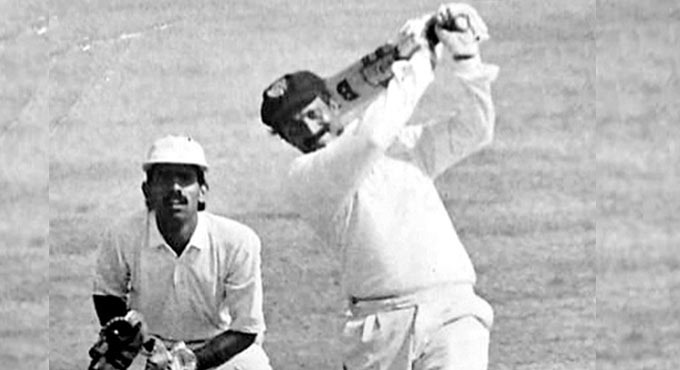
Abdul Azeem Khan. Or just Abdul Azeem. He was much more than just an erstwhile school mate, one-time rival captain, feared opening bat and mercurial fielder. He was a humble and wonderful human – and for the life of me, I cannot imagine having to write in the past tense about a man a few months my senior.
Perhaps, I should have mentally prepared myself to write his obituary once it became known that the doctors had all but thrown their hands up and asked his family to take him home on Tuesday afternoon, indicating that he could pass inside 48 hours. But deep down, there was hope of a miraculous turnaround, of his strong will to triumph over the issues subjecting his body to undefinable agony.
That was not to be.
At 8:40pm, his daughter notified our school WhatsApp group that he had passed. He was diagnosed with a kidney ailment in 2021, and eventually underwent a kidney transplant in February this year. He was admitted to hospital a few days ago, his condition worsening as the infection spread to the brain and lungs.
But that is not how we will remember Azeem. We will remember him for his flamboyant batting, his warm, genial personality and some wonderful conversations about cricket and life. We will remember him for being our schoolmate, a great team-man and a wonderful benefactor to Mohammed Siraj, current India pace ace.
Azeem came to be respected as a batter who was impulsive, lyrically at that, and daring – not very usual qualities back in the 1980s. As a stroke player, he combined the finesse of an ML Jaisimha and an Abbas Ali Baig with raw power that made for exhilarating watching. He was Hyderabad’s most successful opening bat before MV Sridhar displaced him.
My earliest memory of Azeem is an inter-school game where, having changed schools, I was squaring up against him as his rival captain. We were undeniably the weaker team and expected him to opt to field upon winning the toss, so that the game would end early. He proceeded to bat first and caned our tardy attack to make a breezy hundred.
A decade later, he had already been playing first-class cricket for seven seasons when I returned to Hyderabad after four years as a sports journalist. A fortnight after I switched jobs and returned home from Madras, he posted an unbeaten 303 against Tamil Nadu at the Gymkhana ground in Secunderabad in December 1986.
He became only the seventh batter to score a triple century in Ranji Trophy history, sharing double-century stands with two left-hand batters – Vijay Mohan Raj, for the first wicket, and Khalid Abdul Qayyum for the fourth. It was an innings that nobody who was privileged to watch could forget. Nor will those who watched his century in the Ranji Trophy final against Delhi forget that knock.
Azeem conjured a brilliant 114 to blunt the Delhi bowling attack which included Atul Wassan, Sanjeev Sharma, Mohinder Amarnath and Kirti Azad, the skipper. With 756 runs in Hyderabad’s successful Ranji Trophy campaign in 1986-87, he was the third-highest scorer that season behind Carlton Saldanha (782) and KP Bhaskar (781).
It was the season in which Azeem shared a great partnership with Vijay Mohan Raj (who scored 751 runs himself) and gave Hyderabad many wonderful starts. In a career spanning 16 seasons, Azeem played 73 first-class matches, scoring 4651 runs at an average of 43.46, with 12 centuries. The year 1987 saw him play a lone Duleep Trophy match, and a single Irani Cup game.
From being the lad who carried his elder brothers’ kit with pride, he finished as the man who played 114 first-class innings without ever being dismissed for a duck. It would not be wrong to say that Azeem’s batting (and that of K Srikkanth) prepared some of us for the audacious strokeplay that Virender Sehwag treated us to some years later.
Blessed with exceptional eye-hand coordination, Azeem was also technically sound, having been groomed in the art of batting by no less a coach than AR Bhupathi at the Lal Bahadur Stadium. The batting crease was the place he would show his fearlessness and aggression, much to the dismay of rival bowlers who always felt they had a chance against him.
The only ‘blip’, if it could be called that, came in February 1991 when he gifted his wicket away with an extravagant stroke off Hari Gidwani, the Bihar skipper, and earned the wrath of his own captain, Mohammed Azharuddin, who insisted that he be dropped from the side for the next game, the semifinal against Bombay.
To be fair to Azeem, he never spoke ill of Azharuddin, despite the verbal altercation at the Mecon ground in Ranchi. Azeem was Azhar’s senior in All Saints High School, and they were great friends and colleagues at the State Bank of India. He took the Hyderabad Cricket Association decision to suspend him for a game in his stride, and played a few more seasons before calling it a day.
Away from the spotlight, he spent time as coach and selector, sharing the knowledge gained from his vast experience of first-class cricket with anyone who was keen to pick his brain. He always had time for his schoolmates, joining them on their travels across the country and sharing moments of joy and camaraderie.
He was a benefactor to Siraj, whose mother was a house help in Azeem’s sister’s home. She persuaded Azeem to help Siraj since he was not keen on academics and kept playing cricket. Despite not being convinced of the paceman’s talent, Azeem introduced him to his friends so that he could play league cricket, and then convinced the selectors to watch him.
Rest in peace, Abdul Azeem Khan. One-time schoolmate, one-time rival captain, feared opening bat, mercurial fielder, rare entertainer. Above all, a humble and wonderful human.



